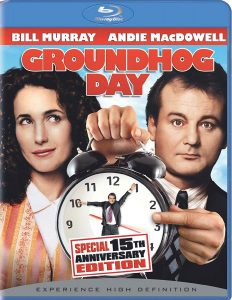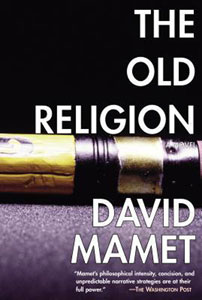David Mamet is known for writing great dialog, but “The Old Religion” — his 1997 novel about the murder trial and conviction of innocent Jewish factory manager Leo Frank in 1914 Atlanta — is mostly an inner monologue. While the book is based on historical facts, getting into Frank’s head is purely a matter of the author’s imagination. But the directions Frank’s mind goes in as he tries to make sense of what’s being done to him feel accurate.
Initially distracting style
Mamet is the only writer I know of who uses quote marks when people are thinking, in addition to when they are speaking. This is distracting at first – as it also was for me when reading “Chicago” (2018) – especially since Frank’s thoughts come amid dialog with his wife and friends at a lake retreat early in the book.
Gradually, “The Old Religion” becomes primarily an inner monologue, starting when Mamet suddenly peppers Frank’s thoughts about the courtroom’s wall paneling into a chapter about another topic. If a reader had somehow gone into “The Old Religion” cold, they’d probably find the opening chapters boring and meandering, thinking the book has no focal point.

The transition of Frank’s thoughts to the wall paneling signify that the novel is getting at something (for those who went in cold), or getting to the point (for those who know the general outline). It’s also a chilling way to show how someone’s life can be turned upside down even if it all seems so casual and matter-of-fact when you’re in the thick of it, as if it’s happening to someone else.
The lack of a sharp transition or high drama helps to show how events are sweeping Frank along. His observation about the courtroom wall is delivered with seemingly the same level of interest as his realization that his lawyer doesn’t want to win the case. (Since the public is against Frank, it’s in the lawyer’s best career interest to lose.)
Frank also gradually realizes the handwriting evidence that will prove a key witness (the actual killer of a girl at the factory) is lying will never be presented; it’s something his lawyer has teased Frank with to keep him complacent.
Critiques of religion, nationalism
As Frank’s mind wanders in his jail cell, Mamet delivers on-point criticism of religions, which include not only spiritual religions but also nationalism. Specific to the Frank case, these are Christianity, the Scripture of which offers examples where it’s OK to kill; and America, in which democracy often means the sanctioning of mob rule – and in this story’s case, a sham trial.
Institutions that say bad things are good things will naturally appeal to a lot of people – and while we as a reader might not be guilty of nationalism or religious fervor, we are almost certainly guilty of seeking justifications for bad behavior at some point in our lives.

In addition to the criticism of religions, Frank also questions his own religion, Judaism, but in broad enough ways that it functions as musings on the existence, nature, traits, wants and needs of God. You can probably imagine the rabbit holes. If God cares about my life, why is he letting this happen to me? If God doesn’t care, then what makes him worthy of being worshiped?
I’ve always found stories of mobs turning on an innocent person to be bizarre in this sense: Everyone who is reading the book (or watching the film or TV show) thinks the mob behavior is disgusting, and pities the poor individual. Are we consumers of the book (or other media) a more enlightened group? That would explain the disconnect, but it seems arrogant to assume I’m better than anyone else. But if the book’s readers are not abnormally enlightened, why are we not represented in the story?
Frank almost touches on this himself, as he imagines a pendulum of public opinion. At some point (although it might be too late to save him), he believes it will swing back in his favor. This is indeed what happened, of course, as he is now historically known as a famous victim in a classic example of an American sham trial.
Short on other POVs
Another way Mamet could’ve added balance would be to show the points of view of Frank’s wife and friends, who presumably know he’s innocent. I understand why the author left those POVs out, though. Frank’s isolation is the point of “The Old Religion,” and sympathetic POVs would be redundant to what we are already thinking as a reader.
Interestingly, although Frank intellectually knows he is a victim, he also hates his own guts, figuring he has what’s coming to him since he’s just sitting there meekly in the courtroom and in his cell (even though he is legally required to sit there meekly). His mind even wanders back to the day of the murder and he chastises himself for going to the office, where he was then in position to be blamed for the murder.
I generally don’t enjoy stories about wrongs done by the state to innocent people; by their nature, they aren’t pleasant to read, and – other than the horrifying specifics – I’m not learning anything that I don’t already know.
(Granted, my view that the Eighth Amendment protecting prisoners of the state against cruel and unusual punishment needs to be more robust is not mainstream. I also think there should be serious repercussions for judges, jurors and prosecutors who convict innocent people; that’s even further from standard views. But I think it’s safe to say that most readers do not condone what happened to Frank, even if they may defend the government’s justice system in a broader sense.)
Surprisingly, an easy read
But while “The Old Religion” is certainly in the “wrongfully accused” genre, it’s actually a rather easy read for something so grim, with most chapters being only a few pages long and focusing on a specific idea, usually a philosophical one. It’s nice to know Frank’s thoughts go down weird paths just like anyone’s would when left alone too long with them.
Also, as we close the book after its horrific final paragraphs, we have the relief of knowing this happened more than a century ago, and we can then fool ourselves by saying “Well, at least nothing this bad happens anymore.”

